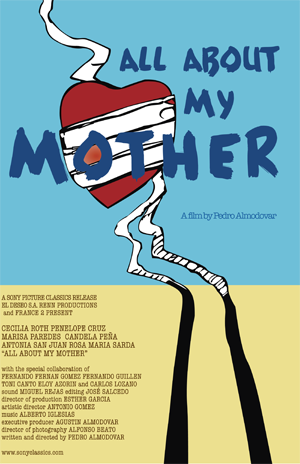
ALL ABOUT MY MOTHER
Spain, 1999, 102 minutes, Colour.
Cecilia Roth, Marisa Paredes, Antonia San Juan, Penelope Cruz, Toni Canto.
Directed by Pedro Almodovar.
Pedro Almodovar has never made it a secret that his taste is flamboyant, melodramatic with more than a touch of sentiment. He has been, in fifteen years of moviemaking, fascinated by sexuality, by violence and by intense but tangled relationships. In there, there has also been a spasmodic return to religion, a critique of Spanish piety and of Opus Dei, as well as a respect for religious people who are not hypocritical. Fifteen years on, his interests have not changed, but his tone and treatment have. While sometimes 'in your face', he is more guarded. He still confronts but does not taunt. He is eliciting a response to his characters and their plight rather than pitching them at us.
This is part of the reason why All About My Mother is authentic Almodovar while being wide-audience-friendly. His passion for the lush style of Sirk, the primary- coloured decor and emotions and here, specifically, the Blanche Dubois parallels from 'A Streetcar Named Desire' make his work distinctive.
The characters come from a world which reminds us that Jesus sought the company of tax collectors and sinners. This is a Barcelona world of street prostitution, transvestites, of the theatre and emotional dependencies, of care for those in need and personal tragedy, of AIDS, of death. And yet it is a world of compassion, a greater compassion than Almodovar has so far portrayed on screen. It is not surprising that he won the Director award at Cannes 1999. The film also won the Ecumenical Award.
1. The film's acclaim and awards? Almodovar's reputation in Spanish cinema, world cinema?
2. The Madrid settings, Barcelona and its various worlds, the worlds of each character?
3. Almodovar and his lush style, sets and decor, details, ornamented? Colours and styles? The musical score?
4. The cinema and theatre influence: All About Eve, A Streetcar Named Desire? Truman Capote and The Quote, Lorca, Tennessee Williams? The American influence, American melodrama, gay icons?
5. The title and the focus on Manuela and the various women as mothers? Manuela as mother, her bringing up Esteban, her love for him, his birthday, the present, going to the theatre? Esteban as a young man, school, ambitions, love for his mother, the search for his father? Going to get the autograph? The accident of his death?
6. The effect on Manuela, her grief, the hospital, allowing Esteban's organs to be donated? Her promise to Esteban, the decision to go to his father? The decision to go to Barcelona and her past?
7. The sequences from Streetcar Named Desire and the performances throughout the film? Characters, themes and interactions? Reflecting the characters of the film? Their emotional crises? Manuela performing in the past with Esteban? Huma Rojo and her star status, her performance? Her being a Blanche Dubois kind of character? The family in the play, physical abuse, sexual relationships, madness?
8. Barcelona, its subcultures? Manuela and her search for Lola? Encountering La Agrada and being beaten up? Recognising her, her support, getting her settled? Going back to the memories, explaining the situation to the audience?
9. Manuela and her decision to meet Rojo, going to the theatre, Rojo and her imperious style, performances, reaction from the audience and fans? Her assistant and her tantrums, drug-taking? The sexual relationship? Manuela and her support as an emergency, working together with Rojo, their discussions together, her finding out the truth about Esteban's death and her memories? The theatre world, confiding in Manuela, the contrast with her assistant? The ups and downs of the relationship?
10. The use of the film clip from All About Eve and the implications of the leading actress and her being overtaken by the assistant? Manuela as Eve? The assistant as Eve? Covetous of Rojo's roles? The competition, the power, actresses vying with one another? Manuela knowing the play - and her ultimate performance and acclaim? The assistant's jealousy?
11. La Agrada and her friendship with Sister Rosa? Rosa and another world, the convent, justice and poverty? The church? The surprise of her pregnancy - and the credibility of her becoming pregnant, let alone by Lola? HIV-positive? Her decisions? Manuela taking care of her, going to see her mother? Her own mother and her disdain (and her background as a forger)? Her father and his madness and being ineffectual? The decision to leave the convent? Giving birth to the child, Manuela nursing her, her death?
12. La Agrada and the comedy, the world of transvestites, gay clubs? Humour? The friendship with Manuela? Lola and the sex change, the relationship with Sister Rosa? Manuela telling him the truth about his son? His new son?
13. Lola, the background as an actor, relationship with Manuela, transvestite, the sex change, HIV-positive? His death?
14. Themes of children and parents, mothers? Maternal instinct, bearing their children, nursing and caring? Manuela, Rojo, Sister Rosa, her mother all as mother images? Images and emotions? A particular world leading to universal understanding?